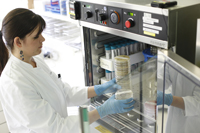
New biofunctional fabrics prove effective against dust mites
We are all familiar with the musty smell on public transport, in old cars or from seat cushions, which is caused by moisture build-up due to sweat, spilt liquids or condensation which gathers inside the upholstery and encourages the growth of bacteria and fungi. In order to find a solution to the problem, researchers at the Hohenstein Institute in Bönnigheim, in partnership with the Institute for Wood Technology in Dresden (IHD) and the Research Institute for

20th December 2010
Innovation in Textiles
|
Bönnigheim
 We are all familiar with the musty smell on public transport, in old cars or from seat cushions, which is caused by moisture build-up due to sweat, spilt liquids or condensation which gathers inside the upholstery and encourages the growth of bacteria and fungi.
We are all familiar with the musty smell on public transport, in old cars or from seat cushions, which is caused by moisture build-up due to sweat, spilt liquids or condensation which gathers inside the upholstery and encourages the growth of bacteria and fungi.
In order to find a solution to the problem, researchers at the Hohenstein Institute in Bönnigheim, in partnership with the Institute for Wood Technology in Dresden (IHD) and the Research Institute for Leather and Plastic Sheeting in Freiberg (FILK), are working to develop new types of upholstery which would be suitable for use on public transport and for car seats, easy chairs and mattresses.
The project is focussing on discovering the connection between the accumulation of moisture and the colonisation by bacteria or fungi in these areas. The researchers aim to come up with guidelines for selecting materials and for structural designs which would help to transport moisture inside the upholstery away, thereby improving hygiene.
According to the Hohenstein Institute, the results of the research will be important both for the upholstered furniture industry and for manufacturers of car seats or textile furniture covers. It will mean that, in future, complaints about unpleasant smells and stains and the resulting shortened service life of upholstered seats can be largely avoided, the institute’s scientists say.
“We are grateful to the Research Association the Textile Research Council, Reinhardtstraße 12 - 14, 10117 Berlin for its financial support for IGF project AIF no. 293 ZBG, which was provided via the AIF as part of the programme to support ‘Industrial Community Research and Development’ (IGF), with funds from the Federal Ministry of Economics and Technology (BMWi) following an Order by the German Federal Parliament,” the Hohenstein Institute said.

Business intelligence for the fibre, textiles and apparel industries: technologies, innovations, markets, investments, trade policy, sourcing, strategy...
Find out more